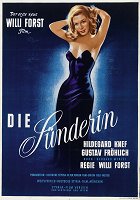Rendező:
Willi ForstOperatőr:
Václav VíchZeneszerző:
Theo MackebenSzereplők:
Hildegard Knef, Gustav Fröhlich, Karl-Heinz Kreienbaum, Benno Gellenbeck, Carl Voscherau, Wera Frydtberg, Änne Bruck, Horst von Otto, Theo Tecklenburg (több)Recenziók (1)
NFA: "The creators themselves were aware that the thematization of violence against women, prostitution, suicide, and assistance in suicide could provoke disapproval, and they consulted the subject matter with representatives of authorities and the church. As a result, a smoother and more melodramatic film was created than it was initially, but it was all in vain. The commission of the FSK (Freiwillige Selbstkontrolle = Voluntary Self-Control - a humorous name for an institution in the country that officially abolished censorship) refused to recommend the film for screening, and the churches declared a boycott against it. Demonstrations and counterdemonstrations were held in front of movie theaters, and the screenings in the movie theaters were loudly disrupted." The most interesting aspect of the film is the retrospective flow of flashbacks and multiple different temporal planes of the past (it sounds more complicated than it actually is) presented by the monologue of a single narrator. The subjectivity and intimacy derived from this is supported by the fact that the narrator does not address us, but rather her object of love. Moreover, he does not respond, so the whole story actually unfolds within the soul and memory of a single person, whom we are compelled to observe from the outside as she pursues reconciliation with her own past and her final acts of freedom - we become judges, evaluating the credibility of the repentance of a person who has fully exposed herself before us, like that ancient predecessor who could only be judged by the judges after she was stripped naked before them.
()

